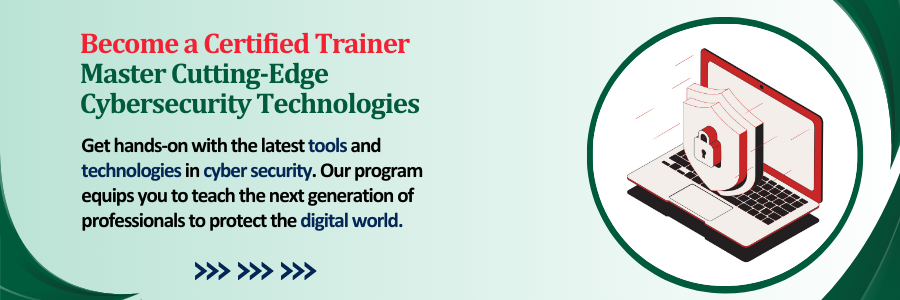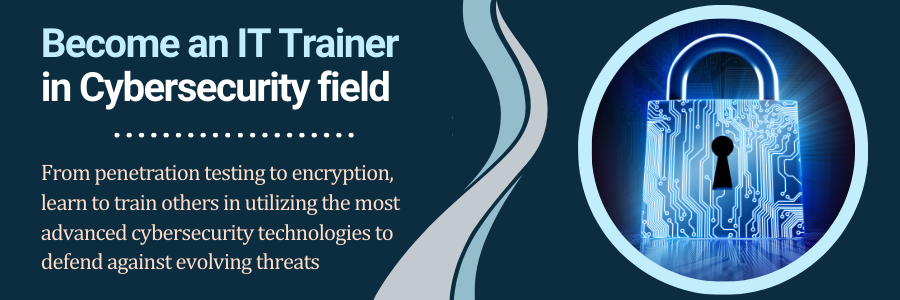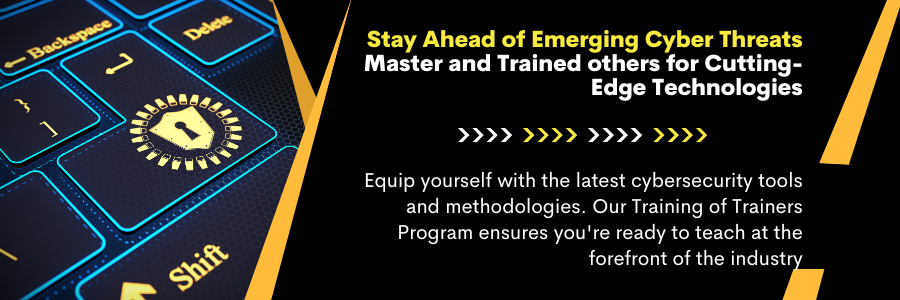



Cybersecurity Training of Trainers (TOT) Program
Welcome to the Four-Year Cybersecurity Training of Trainers (TOT) Program, a transformative journey designed to elevate IT professionals into world-class cybersecurity experts and educators. As cybersecurity becomes an increasingly critical aspect of global technology infrastructure, this program offers a unique opportunity to be at the forefront of both cybersecurity practice and education.
Structured across four progressive levels—O-Level (Beginner), A-Level (Intermediate), B-Level (Advanced), and C-Level (Expert)—this comprehensive initiative not only builds your technical expertise but also prepares you to mentor and train the next generation of cybersecurity professionals. With a focus on hands-on experience, real-world applications, and specialized cybersecurity techniques, you’ll emerge equipped to lead in high-stakes environments and shape future cybersecurity strategies.
Over four years, you will journey through 48 distinct courses spread across eight semesters, covering everything from foundational IT skills to advanced penetration testing, digital forensics, cryptography, and leadership in cybersecurity policy and operations. Whether you are driven by a desire to enhance your career or contribute to securing organizations worldwide, this TOT program will empower you to become a thought leader and educator in the ever-evolving world of cybersecurity.
Program Objective
The Cybersecurity Training of Trainers (TOT) Program is designed to equip IT professionals with the technical and educational skills necessary to excel in both cybersecurity roles and as leaders in the field. The program targets individuals who seek stability, reliability, and robust career advancement, especially in leadership roles, without the need for a formal university-based degree. It serves as an alternative to traditional academic pathways by offering non-formal, non-accredited training, while providing internationally recognized system of training and development based on ISO 9001 and ISO 29993.
Participants are expected to have clarity about their career goals, often being sponsored by government or private sector organizations. With the program offering a 100% fee-waiving scholarship for sponsored participants (worth $10,000 per semester), it ensures accessibility for those fully committed to pursuing cybersecurity careers. This program emphasizes hands-on learning and practical experience, ensuring that participants emerge as highly skilled cybersecurity professionals ready to take on leadership and training roles.
Read More- Develop Expert-Level Cybersecurity Trainers: The primary objective of the program is to transform participants into expert cybersecurity trainers, capable of educating others on the latest cybersecurity technologies, methodologies, and best practices.
- Master Technical Cybersecurity Skills: Equip participants with advanced technical skills across key areas such as penetration testing, digital forensics, cryptography, secure communications, and enterprise security architecture, enabling them to manage and defend complex IT environments.
- Prepare Leaders for Cybersecurity Roles: Train participants to assume leadership roles within organizations, enabling them to manage large-scale security operations, develop cybersecurity policies, and lead cybersecurity teams with confidence.
- Foster Mentorship and Coaching Abilities: Prepare participants to serve as mentors and coaches, capable of guiding peers and junior professionals through the complexities of cybersecurity and encouraging continuous learning and professional growth.
- Equip Participants with Consulting Skills: Develop participants’ consulting abilities, allowing them to provide expert guidance on cybersecurity risk management, regulatory compliance, and strategy development to organizations and businesses.
- Develop Curriculum Design and Educational Materials: Train participants to create world-class training materials, from text to multimedia and computer-based modules, ensuring they can deliver high-quality, engaging cybersecurity education in diverse settings.
- Promote Innovation and Thought Leadership: Encourage participants to think critically and innovatively, contributing to the evolution of cybersecurity practices through research, participation in industry discussions, and the development of new methodologies.
- Build a Global Network of Cybersecurity Professionals: Foster relationships within the global cybersecurity community, connecting participants with industry professionals, potential employers, and fellow educators, enhancing collaboration and career development.
- Comprehensive Four-Level Structure: The program is divided into four progressive levels—O-Level (Beginner), A-Level (Intermediate), B-Level (Advanced), and C-Level (Expert)—ensuring a step-by-step mastery of cybersecurity skills and training techniques.
- 48 Distinct Courses Across 8 Semesters: Each level includes specific technical and teaching-focused courses, with a total of 48 courses spread over 16 quarters. Every course builds on the previous one to ensure continuous skill development.
- Hands-On, Real-World Experience: The program emphasizes practical, internship-based learning where participants are immersed in live cybersecurity operations, gaining hands-on experience in system administration, network security, penetration testing, and incident response.
- Specialized Training in Offensive and Defensive Security: Participants learn both offensive techniques, such as penetration testing and red team operations, and defensive strategies, including network forensics and advanced malware analysis, preparing them to tackle sophisticated cyber threats.
- Leadership and Consulting Skills Development: Beyond technical skills, the program cultivates leadership abilities, focusing on cybersecurity policy development, risk management, regulatory compliance, and consulting, preparing participants to take on high-level strategic roles.
- Mentorship, Coaching and Teaching Methodologies: The TOT program equips participants to become effective educators, with training on curriculum development, coaching techniques, and the creation of high-quality cybersecurity training materials tailored to diverse learning styles.
- Community Engagement and Thought Leadership: Participants are encouraged to contribute to the cybersecurity community through outreach initiatives, becoming mentors, coaches, and thought leaders in the field, fostering a sense of responsibility and leadership.
- Full Scholarship for Sponsored Participants: The program offers 100% fee-waiving scholarships for participants sponsored by member organizations, with a training value of $10,000 per semester, making it accessible to highly committed professionals.
Program Structure
Here is the breakdown of the four levels (O-Level, A-Level, B-Level and C-Level) divided into four quarters, with each quarter focusing on specific topics. This will provide a structured learning pathway at each level.
- O-Level (Beginner) – Year 1: The O-Level is designed as an entry point for individuals who are new to the cybersecurity field. It focuses on building a solid foundation in IT systems, computer hardware, operating systems, networking, and basic security principles. The curriculum is structured to provide trainees with essential technical skills and prepare them for more advanced learning in cybersecurity.
- A-Level (Intermediate) – Year 2: A-Level deepens participants’ understanding of cybersecurity concepts by introducing more specialized topics such as penetration testing, digital forensics, and cloud security. This level is geared towards transitioning trainees from general IT practitioners to cybersecurity specialists, with a focus on threat detection, security testing, and incident response.
- B-Level (Advanced) – Year 3: The B-Level takes participants further into advanced cybersecurity topics, including cryptography, secure communications, and enterprise security architecture. At this stage, trainees master both offensive and defensive security strategies, preparing them to handle sophisticated cyber threats and to design robust security systems for organizations.
- C-Level (Expert) – Year 4: C-Level is the final and highest tier of the program, designed to prepare participants for leadership roles in cybersecurity. Trainees are equipped to manage large-scale security operations, create security policies, and consult on complex cybersecurity matters. The focus shifts to developing the skills needed to lead, train, and mentor others in the field of cybersecurity, as well as to provide expert guidance at the organizational level.
O-Level: Entry-Level Training
The O-Level serves as the starting point for individuals new to cybersecurity, focusing on foundational IT skills, including hardware, operating systems, networking and basic cybersecurity concepts. The Purpose of level is to provide trainees with the essential skills required to manage and secure IT infrastructure. This level ensures participants are proficient in basic IT operations and prepared for more advanced cybersecurity studies. The intention of O-level includes equipping trainees with hands-on experience in IT systems management, network configuration and system security. It establishes a strong technical base for future advanced learning.
- Develop foundational technical skills in managing IT infrastructure.
- Provide a hands-on approach to system administration.
- Prepare participants for advanced cybersecurity concepts.
- Ensure participants understand basic network security and troubleshooting.
01 Quarter - TechPro Bridge
It introduces participants to essential IT administration skills. Trainees will learn how to manage Windows-based systems, setting the stage for understanding network security later in the program. The purpose is to familiarize participants with the practical aspects of IT system configuration and troubleshooting. The intention is to build confidence in managing operating systems and troubleshooting common issues, establishing a strong technical foundation necessary for more advanced security topics. It includes following courses:
- CompTIA A+
- Windows 10 Desktop
- Windows Server Administrator
02 Quarter - TechPro Essential
It expands on the foundational knowledge from Quarter 1 by introducing Linux system administration and cloud computing concepts. This quarter ensures that participants are familiar with managing both on-premises and cloud infrastructures. The purpose is to diversify trainees' technical skills, preparing them for the complexity of modern IT environments. The intention is to ensure participants can navigate and secure cloud environments while strengthening their understanding of server administration and virtualization. Quarter 2 includes following courses:
- Linux Server+: Develops the ability for Linus adminstration to manage Linux servers.
- CompTIA Cloud+: Provides knowledge about cloud infrastructure and management.
- AWS Cloud: Introduces cloud computing on the AWS platform.
03 Quarter - TechPro NetXpert
This quarter is focused on networking fundamentals. Participants learn how to configure and secure networks through routing, switching, and network virtualization. The purpose is to provide trainees with in-depth knowledge of networking concepts that are critical to cybersecurity. The intention is to build proficiency in network management and security, ensuring participants can design and maintain secure networks for organizations. Following are the courses in Quarter 3:
- CompTIA N+: Networking fundamentals.
- Network Virtualization (VMware Certified Professional): Network virtualization management.
- CCNA Routing and Switching: Cisco-certified networking and routing techniques.
04 Quarter - TechPro Security
This quarter introduces trainees to network security, ethical hacking, and the basics of penetration testing. The purpose is to prepare participants for their first steps into the world of cybersecurity by teaching them how to secure IT systems from cyber threats. The intention is to ensure that participants can identify and protect against vulnerabilities, equipping them with foundational skills in ethical hacking and network security. Following are the courses in Quarter 4:
- CompTIA Security+: Network security certification.
- CCNA Security: Cisco-certified network security protocols.
- Ethical Hacking Basics: Introduction to ethical hacking concepts.
A-Level: Intermediate Training
The A-Level represents the intermediate stage of the Training of Trainers (TOT) program, aimed at building on the foundational cybersecurity skills developed in the O-Level. It introduces more specialized topics such as penetration testing, incident response, digital forensics, and cloud security, preparing trainees for real-world cybersecurity challenges. The purpose of this level is to transition participants from general IT practitioners to cybersecurity specialists capable of threat detection and security testing. The intention is to produce trainees with the skills necessary to secure IT systems and respond to security incidents effectively.
A-Level Objectives:
- Develop intermediate skills in cybersecurity threat detection and response.
- Provide hands-on experience with penetration testing and vulnerability assessments.
- Equip participants with digital forensics and incident response capabilities.
- Strengthen cloud security understanding for modern IT infrastructures.
- Prepare participants for advanced cybersecurity concepts and practices.
05 Quarter - PenTest Intensive
Quarter 5 focuses on penetration testing, a key element of offensive security. The purpose is to familiarize trainees with ethical hacking techniques, enabling them to identify system vulnerabilities before they are exploited by malicious actors. The intention is to build a strong foundation in offensive security practices, including advanced ethical hacking and application security testing.
Courses in Quarter 5:
- Ethical Hacking Advanced
- Web Application Penetration Testing
- Mobile Application Penetration Testing.
06 Quarter - ForensicRescue
Quarter 6 shifts focus toward forensic analysis and incident response. The purpose is to train participants in identifying, analyzing, and mitigating the impact of security breaches. The intention is to ensure trainees can effectively manage cyber incidents, recover compromised systems, and perform forensic investigations.
Courses in Quarter 6:
- Digital Forensics Basics
- Incident Response and Disaster Recovery
- Forensic Analysis Techniques
07 Quarter - CryptoGuard Essentials
Quarter 7 introduces cryptographic methods and blockchain technologies, focusing on how they are used to secure digital communications and transactions. The purpose is to develop a deep understanding of cryptographic protocols and their applications in cybersecurity. The intention is to prepare participants for roles requiring strong encryption skills and secure communications management.
Courses in Quarter 7:
- Foundations of Cryptography
- Management and Cryptographic Protocols
- Blockchain Fundamentals.
08 Quarter - ConsultTrackITDefend
Quarter 8 shifts focus to cybersecurity consulting and governance. The purpose is to train participants in IT auditing, policy-making, and cybersecurity governance, ensuring they are prepared to offer consulting services and lead in organizational security. The intention is to produce cybersecurity professionals who can guide organizations in maintaining secure infrastructures and complying with cybersecurity regulations.
Courses in Quarter 8:
- IT Auditing Fundamentals
- Cybersecurity Governance
- Consulting in Cybersecurity.
B-Level: Advanced Training
The B-Level represents the advanced stage of the Training of Trainers (TOT) program, delving deep into advanced cybersecurity topics such as cryptography, secure communications, and enterprise security architecture. This level is focused on developing mastery in both offensive and defensive security strategies. The purpose is to enhance participants’ technical expertise, preparing them to design robust security systems and respond to sophisticated cyber threats. The intention is to create cybersecurity professionals who are capable of performing advanced penetration testing, exploit development, and forensic analysis while securing complex IT infrastructures.
B-Level Objectives:
- Master advanced penetration testing and vulnerability assessment techniques.
- Develop expertise in exploit development and social engineering attacks.
- Gain deep knowledge in cryptography and secure communications.
- Learn advanced forensic investigation methods for sophisticated incidents.
- Design and implement secure enterprise architectures and network infrastructures.
- Equip participants with skills in threat hunting and incident response for advanced threats.
09 Quarter - Advanced PenTest Methods
Quarter 09 focuses on advanced offensive security, particularly penetration testing and exploit development. The purpose is to develop participants' expertise in identifying vulnerabilities and exploiting them through sophisticated techniques. The intention is to prepare participants to carry out complex penetration tests and lead offensive security operations that help organizations strengthen their defenses.
Courses in Quarter 09:
- Advanced Penetration Testing Techniques
- Exploit Development
- Social Engineering Attacks.
10 Quarter - Advanced Forensics and Incident Handling
Quarter 10 shifts the focus to advanced digital forensics and incident handling. The purpose is to equip participants with the skills to conduct thorough investigations of cyber-attacks and manage incident responses effectively. The intention is to prepare participants to identify, analyze, and respond to complex cyber threats, ensuring systems are restored and future risks are mitigated.
Courses in Quarter 10:
- Advanced Digital Forensics
- Threat Hunting and Incident Response
- Network Forensics.
11 Quarter - Cryptography and Secure Communications
Quarter 11 covers advanced cryptographic techniques and secure communications. The purpose is to equip trainees with a deep understanding of how cryptographic algorithms are applied to protect data and ensure the security of communications. The intention is to develop participants' ability to implement and manage secure communications in enterprise systems.
Courses in Quarter 11:
- Cryptographic Algorithms
- Secure Network Communications
- Steganography and Data Obfuscation
12 Quarter - Security Architecture
Quarter 12 focuses on the design and implementation of secure IT architectures. The purpose is to prepare participants to build secure systems for enterprises, integrating security into every stage of development and operations. The intention is to ensure that participants can create robust, scalable security architectures that protect against both internal and external threats.
Courses in Quarter 12:
- Enterprise Security Architecture
- Zero Trust Architectures
- Secure DevOps and Software Security
C-Level: Expert-Level Training
The C-Level represents the final and most advanced stage of the Training of Trainers (TOT) program, focusing on preparing participants for leadership roles in the field of cybersecurity. This level is designed to develop expert-level skills in offensive and defensive security, policy-making, risk management, and consulting. The intention is to produce cybersecurity professionals who can lead cybersecurity teams, develop strategies, and mentor the next generation of cybersecurity professionals. Participants at this stage will focus on high-level cybersecurity challenges and executive roles within the industry.
C-Level Objectives:
- Develop expert-level offensive and defensive cybersecurity skills.
- Train participants in cybersecurity leadership and policy-making.
- Equip participants with risk management and regulatory compliance knowledge.
- Foster mentorship, teaching, and consulting skills for cybersecurity professionals.
- Prepare participants to lead large-scale cybersecurity operations and strategy development.
13 Quarter - Offensive Security Operations
Quarter 13 focuses on advanced offensive security strategies, including red team operations and threat modeling. The purpose is to equip participants with the skills to simulate sophisticated cyber-attacks and assess the defense mechanisms of organizations. The intention is to create experts capable of leading offensive cybersecurity teams, improving security postures, and defending against advanced threats.
Courses in Quarter 13:
- Red Team Operations
- Threat Modeling and Simulation
- Cyber Range Exercises.
14 Quarter - Cyber Defense Strategies
Quarter 14 shifts focus to advanced defensive cybersecurity techniques, particularly blue team operations and malware analysis. The purpose is to prepare participants to lead defensive efforts against cyber threats, ensuring that they can effectively analyze and counteract malware. The intention is to build a strong foundation in defensive security technologies, enabling participants to safeguard critical infrastructures from persistent threats.
Courses in Quarter 14:
- Blue Team Operations
- Advanced Malware Analysis
- Defensive Security Technologies.
15 Quarter - Cybersecurity Policy and Leadership
Quarter 15 emphasizes the development of cybersecurity leadership skills, focusing on policy-making, risk management, and regulatory frameworks. The purpose is to prepare participants to take on executive roles in cybersecurity leadership. The intention is to ensure that participants can manage cybersecurity teams, develop strategies, and ensure compliance with legal and industry standards.
Courses in Quarter 15:
- Cybersecurity Leadership
- Regulatory Compliance and Legal Frameworks.
- Cybersecurity Risk Management.
16 Quarter - Consulting and Training
Quarter 16 prepares participants for high-level consulting and training roles. This quarter focuses on providing advanced consulting services and developing training methodologies for cybersecurity professionals. The purpose is to ensure participants can effectively lead cybersecurity training programs and consult on complex security issues. The intention is to prepare participants to be experts in both teaching and consulting, ready to shape future cybersecurity strategies and professionals.
Courses in Quarter 16:
- Advanced Cybersecurity Consulting
- Training Methodologies for Cybersecurity Professionals
- Capstone Project in Cybersecurity.
